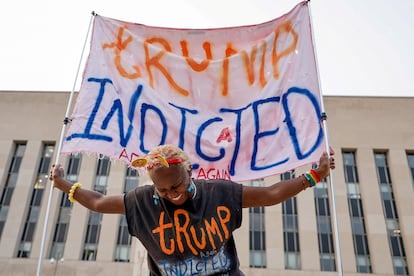Trump’s three indictments: sex, secret papers and votes
The first former president to face criminal trial in the history of the United States confronts serious federal charges that, however, will not prevent him from running for re-election or serving if he wins


Donald Trump has racked up three indictments in just four months. This is in addition to a series of civil lawsuits relating to irregularities in his business conduct and his conviction for sexual abuse and defamation of the writer E. Jean Carroll. But these pale in comparison with the three trials that he will face next year. These are the three cases, in chronological order:
The 'Stormy Daniels' case
On March 25, the first criminal trial against Donald Trump is set to begin in Manhattan over the Stormy Daniels case, involving allegedly falsifying business records to conceal the payment of hush money to silence an extramarital affair during the 2016 election campaign that took him to the White House. Trump feared a scandal in the final stretch of the race and ordered his lawyer and right-hand man, Michael Cohen, to pay Daniels $130,000. That payment was officially recorded as legal expenses in Trump’s company accounts. The Manhattan District Attorney, the Democrat Alvin Bragg, considers that the concealment of the payment was really an attempt to commit or hide another crime (possible violation of campaign finance laws, among others). In late March, a grand jury convened by Bragg voted to indict him on 34 counts. The accusation was formulated the first week of April in the midst of a great media circus. Trump pleaded not guilty to all charges in New York and that same night, at his Florida mansion, he declared: “The only crime I have ever committed has been defending our country from those who try to destroy it.”
The Mar-a-Lago papers
Judge Aileen Cannon, appointed by Trump during his tenure, will preside over the second criminal proceeding against him as of May 20, over the so-called Mar-a-Lago papers. The former president was indicted in June on 37 counts for withholding classified documents that he took from the White House in January 2021, when he handed the presidency to Joe Biden. Special Counsel Jack Smith, who is supervising this case, expanded the indictment last week by incorporating three more charges. Smith also charged a third defendant, the property manager at Mar-a-Lago. As in the Stormy Daniels case, Trump has pleaded “not guilty” to the charges. Along with him, Walt Nauta, his personal assistant, was also charged in June.
Attempt to subvert election results
The third indictment is based on the events that transpired in the two months between the November 2020 elections and January 6, 2021, when a mob of Trump supporters violently stormed Congress with the aim of preventing the certification of Joe Biden’s election victory. Prosecutor Smith has indicted him on four counts, relating to conspiracy to defraud the United States, efforts to obstruct the vote certification proceedings and conspiracy to violate civil rights. Smith has also accused six unidentified “co-conspirators,” one of whom is probably Rudolph Giuliani, a lawyer for Trump. Prosecutors believe that Trump’s claims of having won the election were “false, and the defendant knew they were false.” There is no trial date yet, although Trump is scheduled to appear in the federal district court in Washington on Thursday for arraignment.
Sign up for our weekly newsletter to get more English-language news coverage from EL PAÍS USA Edition
Tu suscripción se está usando en otro dispositivo
¿Quieres añadir otro usuario a tu suscripción?
Si continúas leyendo en este dispositivo, no se podrá leer en el otro.
FlechaTu suscripción se está usando en otro dispositivo y solo puedes acceder a EL PAÍS desde un dispositivo a la vez.
Si quieres compartir tu cuenta, cambia tu suscripción a la modalidad Premium, así podrás añadir otro usuario. Cada uno accederá con su propia cuenta de email, lo que os permitirá personalizar vuestra experiencia en EL PAÍS.
¿Tienes una suscripción de empresa? Accede aquí para contratar más cuentas.
En el caso de no saber quién está usando tu cuenta, te recomendamos cambiar tu contraseña aquí.
Si decides continuar compartiendo tu cuenta, este mensaje se mostrará en tu dispositivo y en el de la otra persona que está usando tu cuenta de forma indefinida, afectando a tu experiencia de lectura. Puedes consultar aquí los términos y condiciones de la suscripción digital.








































